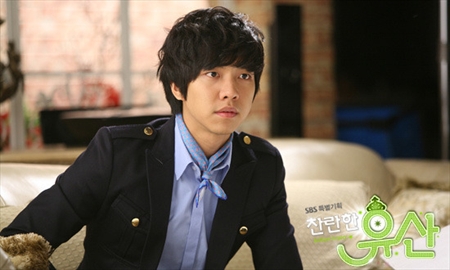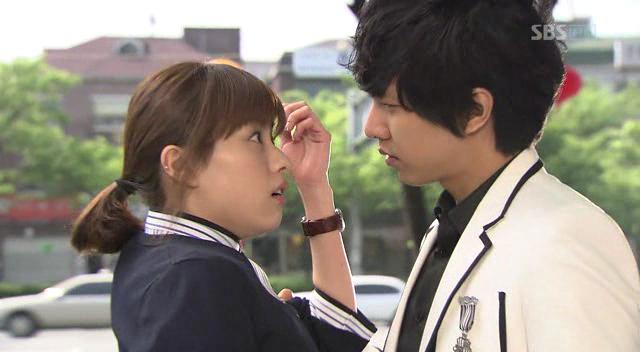For anyone who doesn't know, 2009's Shining Inheritance is a Cinderella story about plucky Go Eun-sung, a girl who loses everything important to her in the blink of an eye. When she's chosen as the heir to an enormous fortune after a lucky encounter with a rich old lady, she consequently infuriates the woman's grandson, who thought all that money was naturally his.
Of course, the drama is far more complicated than that, but let's stick to the basics.
Shining Inheritance, on a surface level, adopts popular character models and manipulates them with strings - the hard-working poor girl, the ass of a chaebol, the jealous second leads. It follows the love-pentagon format obediently and religiously. And yet, there's something more there.
Sun-woo Hwan is perhaps one of my favourite heroes of all time. It's a difficult statement to make, since there are heroes far cooler (I Hear Your Voice), sweeter (Flower Boy Next Door), or more relatable (Nigeru wa Haji, da ga Yaku ni Tatsu) than him appearing every season. But Hwan's character arc is sublime, and there are so many hidden aspects of his personality to unpack that, for the most part, only we as the audience are subject to.
 I'll start from the beginning, where Hwan's defining characteristics materialise like this: his hot and impulsive temper, his immeasurable pride, and his lack of consideration for anyone around him. I'm going to talk about how all three of these things were addressed and transformed over the course of the series. And yes, there will be spoilers.
I'll start from the beginning, where Hwan's defining characteristics materialise like this: his hot and impulsive temper, his immeasurable pride, and his lack of consideration for anyone around him. I'm going to talk about how all three of these things were addressed and transformed over the course of the series. And yes, there will be spoilers.His fluffy hair and baby face directly juxtapose the intolerable way Hwan behaves, making all of the horrible things he does in the first episode (in which he blatantly screws Eun-sung over for fun and looks down on the sincere pleas of his grandmother with an eye-roll and a sneer) instantly seemed redeemable.
At first, Hwan's fury and aggression goes untreated, and it manifests physically. For instance, when Hwan encounters Eun-sung again after her life goes to shit, his first instinct is to drag her along before attempting to reason with her or correct his misunderstandings. The show quickly establishes that Hwan's bad personality is a product of his pampered lifestyle, not necessarily because of any inherent qualities - he has forgotten his privilege, and when the world doesn't rearrange itself to suit him, he lashes out. Hwan's anger-management issues likely originated from the guilt and trauma of losing his father, but escalated because no-one ever called him out. It's clear that this behaviour never had substantial consequences, hence he had no reason to reform it.
 When Eun-sung, in blind hatred, blames him for the way she lost her family, their dynamic immediately changes. Hwan is taught by her that sometimes people must suppress their feelings. He shouldn't be any exception to that societal norm. He has a reason to feel remorse for the first time, and gives Eun-sung the first apology he has ever delivered. She doesn't accept it.
When Eun-sung, in blind hatred, blames him for the way she lost her family, their dynamic immediately changes. Hwan is taught by her that sometimes people must suppress their feelings. He shouldn't be any exception to that societal norm. He has a reason to feel remorse for the first time, and gives Eun-sung the first apology he has ever delivered. She doesn't accept it.It's about then that Hwan stops taking out his anger on other people, and a change in his trajectory begins. Hwan can no longer express his feelings in anger, because he understands how much it can hurt the other party and the damage it can cause. Hwan has to learn a new way to communicate his pain - to his grandmother, to the people who love him, and to the girl that he loves.
 Living like an ordinary person is no easy task for a boy who grew up with everything he could possibly need. With his relationship to money being reminiscent to making use of a tap that never stops running, Hwan spends frivolously and even uses it to buy popularity. This allowed his pride in himself and his background to inflate exponentially, to the extent where you have to wonder how his vessel could have encompassed so much ego.
Living like an ordinary person is no easy task for a boy who grew up with everything he could possibly need. With his relationship to money being reminiscent to making use of a tap that never stops running, Hwan spends frivolously and even uses it to buy popularity. This allowed his pride in himself and his background to inflate exponentially, to the extent where you have to wonder how his vessel could have encompassed so much ego.His belief that he has his wealthy grandmother in the palm of his hand deflates when she effectively cuts him off. Hwan barely copes with the strikes to his pride over the first half of the series - not being bailed out of jail, having to work in a restaurant, not having enough money to take a taxi or eat lunch out, no car, no special treatment. However, he's the only member of his family to come to grips with this fast, maturing much faster than his mother and sister. It's admirable, since he was once the most spoilt and volatile of the three.
 The moment Hwan apologises to a snotty customer, who is clearly supposed to reflect how he was at the beginning of the series, is a pivotal point of his arc. It's the first time he truly displays that he is an adult, as independent and resilient as Eun-sung is.
The moment Hwan apologises to a snotty customer, who is clearly supposed to reflect how he was at the beginning of the series, is a pivotal point of his arc. It's the first time he truly displays that he is an adult, as independent and resilient as Eun-sung is.Once this sympathy for her arises, he becomes more and more inclined to help her and take her side. He's too tangibly involved in her messy life to step back and ignore her. One of the most important episodes to the series is probably sixteen - a lot happens, and in the most important scene Hwan notices Eun-sung asleep on a bench and goes to ridiculous lengths to make her more comfortable, like dragging over a potted plant to shade her face from the sun. It's the type of kindness he is only capable of when she can't see him (at first). Being able of sympathise with someone is so simple, but this feeling teaches Hwan how to care for someone else.
To circle back to the idea that Hwan finds it hard to communicate with Eun-sung, this is all due to his growing affection being stunted at every turn by people trying to change the way he perceives her. He is constantly conflicted by his heart that trusts her, and his brain which is telling him not to. As he overcomes this, he learns how to convey to her what he feels, and slowly, they build an unbreakable camaraderie.
Go on. If I've convinced you of how gratifying Sun-woo Hwan's story is, then go watch Shining Inheritance. I'll wait here until you get back.
No comments:
Post a Comment